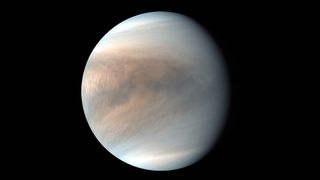Search for possible sign of life in Venus' clouds comes up empty
The airplane-mounted SOFIA telescope didn't see signs of the possible biomarker.

An aircraft-borne telescope could not find signs of a compound possibly linked to biological activity during observations of Venus' atmosphere.
The discovery of a potential signal indicating the presence of phosphine in the clouds of Venus caused a sensation in 2020. This is because phosphine is a possible biomarker, or indicator of potential life.
SOFIA, a far infrared telescope mounted in a 747 aircraft to perform observations not accessible from ground-based observatories, conducted follow-up observations of Venus in an attempt to confirm or refute the finding of phosphine.
Related: After a tantalizing discovery at Venus, what could an astrobiology mission look like?
The result is that SOFIA could not find telltale signs of phosphine during three flights in November 2021, according to a Universities Space Research Association (USRA) statement.
"Phosphine is a relatively simple chemical compound — it's just a phosphorus atom with three hydrogens — so you would think that would be fairly easy to produce. But on Venus, it's not obvious how it could be made," said Martin Cordiner, a researcher in astrochemistry and planetary science at NASA's Goddard Space Flight Center in Greenbelt, Maryland.
Bringing SOFIA to bear on Venus posed its own challenges, according to the USRA team. The planet was visible for only about half an hour after sunset, and the aircraft needed to be in the right place at the right time. Since Venus is inside the orbit of Earth, the planet has phases from our perspective, like the moon, and is close to the sun in the sky.
Get the Space.com Newsletter
Breaking space news, the latest updates on rocket launches, skywatching events and more!
"You don't want sunlight accidentally coming in and shining on your sensitive telescope instruments," Cordiner said. "The sun is the last thing you want in the sky when you're doing these kinds of sensitive observations."
Assisting the international hunt for phosphine in the Venusian atmosphere was one of SOFIA's last science efforts. Its operations ended in September 2022.
Follow us on Twitter @Spacedotcom or on Facebook.
Join our Space Forums to keep talking space on the latest missions, night sky and more! And if you have a news tip, correction or comment, let us know at: community@space.com.

Andrew is a freelance space journalist with a focus on reporting on China's rapidly growing space sector. He began writing for Space.com in 2019 and writes for SpaceNews, IEEE Spectrum, National Geographic, Sky & Telescope, New Scientist and others. Andrew first caught the space bug when, as a youngster, he saw Voyager images of other worlds in our solar system for the first time. Away from space, Andrew enjoys trail running in the forests of Finland. You can follow him on Twitter @AJ_FI.
